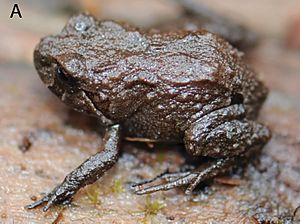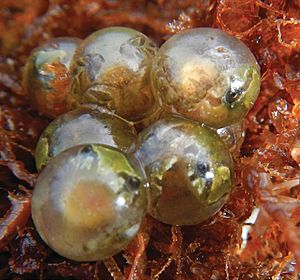Phrynopus facts for kids
Quick facts for kids Phrynopus |
|
|---|---|
 |
|
| Phrynopus badius | |
| Scientific classification |
|
| Kingdom: | Animalia |
| Phylum: | Chordata |
| Class: | Amphibia |
| Order: | Anura |
| Family: | Strabomantidae |
| Subfamily: | Holoadeninae |
| Genus: | Phrynopus Peters, 1873 |
| Type species | |
| Phrynopus peruanus Peters, 1873
|
|
| Diversity | |
| 35 species (see text) | |
Phrynopus is a group of frogs, often called Andes frogs. They belong to the Strabomantidae family. These frogs live only in Peru, a country in South America. You can find them in the high, wet montane forests and grasslands above the tree line in the Eastern Andes Mountains. There's also one record from the Western Andes.
Contents
About Andes Frogs
What are Phrynopus Frogs?
Phrynopus frogs are small to medium-sized. They can be as tiny as 14.5 mm (0.57 in) (about half an inch) long, like the Phrynopus auriculatus. The largest ones, like Phrynopus kauneorum, can grow up to 54 mm (2.1 in) (about two inches) long.
Their head is usually narrower than their body. Most Phrynopus frogs do not have a visible eardrum (called a tympanic membrane) or the ring around it (tympanic annulus). However, two types, Phrynopus auriculatus and Phrynopus peruanus, do have these parts.
Their Skin
The skin on their back (called the dorsum) can be smooth or bumpy. The skin on their belly (called the venter) is usually smooth or has small bumps.
Where They Live
Phrynopus frogs are special because they are endemic to Peru. This means they are found naturally only in Peru and nowhere else in the world. They prefer to live in cool, damp places high up in the Andes Mountains. These areas include humid forests and open grasslands above the tree line.
Species of Phrynopus
Scientists have identified 35 different species within the Phrynopus group. Here are some of them:
- Phrynopus anancites Rodríguez and Catenazzi, 2017
- Phrynopus auriculatus Duellman and Hedges, 2008
- Phrynopus badius Lehr, Moravec, and Cusi, 2012
- Phrynopus barthlenae Lehr and Aguilar, 2002
- Phrynopus bracki Hedges, 1990
- Phrynopus bufoides Lehr, Lundberg, and Aguilar, 2005
- Phrynopus capitalis Rodríguez and Catenazzi, 2017
- Phrynopus chaparroi Mamani and Malqui, 2014
- Phrynopus daemon Chávez, Santa Cruz, Rodríguez, and Lehr, 2015
- Phrynopus dagmarae Lehr, Aguilar, and Köhler, 2002
- Phrynopus dumicola Rodríguez and Catenazzi, 2017
- Phrynopus heimorum Lehr, 2001
- Phrynopus horstpauli Lehr, Köhler, and Ponce, 2000
- Phrynopus interstinctus Lehr and Oróz, 2012
- Phrynopus inti Lehr, von May, Moravec, and Cusi, 2017
- Phrynopus juninensis (Shreve, 1938)
- Phrynopus kauneorum Lehr, Aguilar, and Köhler, 2002
- Phrynopus kotosh Lehr, 2007
- Phrynopus lapidoides Lehr and Rodríguez, 2017
- Phrynopus lechriorhynchus Trueb and Lehr, 2008
- Phrynopus mariellaleo Venegas, Barboza, De la Riva, and Padial, 2018
- Phrynopus miroslawae Chaparro, Padial, and De la Riva, 2008
- Phrynopus montium (Shreve, 1938)
- Phrynopus oblivius Lehr, 2007
- Phrynopus paucari Lehr, Lundberg, and Aguilar, 2005
- Phrynopus personatus Rodríguez and Catenazzi, 2017
- Phrynopus peruanus Peters, 1873
- Phrynopus pesantesi Lehr, Lundberg, and Aguilar, 2005
- Phrynopus remotum Chávez, García Ayachi, and Catenazzi, 2020
- Phrynopus tautzorum Lehr and Aguilar, 2003
- Phrynopus thompsoni Duellman, 2000
- Phrynopus tribulosus Duellman and Hedges, 2008
- Phrynopus unchog Lehr and Rodríguez, 2017
- Phrynopus valquii Chávez, Santa Cruz, Rodríguez, and Lehr, 2015
- Phrynopus vestigiatus Lehr and Oróz, 2012
See also
 In Spanish: Phrynopus para niños
In Spanish: Phrynopus para niños
 | Emma Amos |
 | Edward Mitchell Bannister |
 | Larry D. Alexander |
 | Ernie Barnes |


